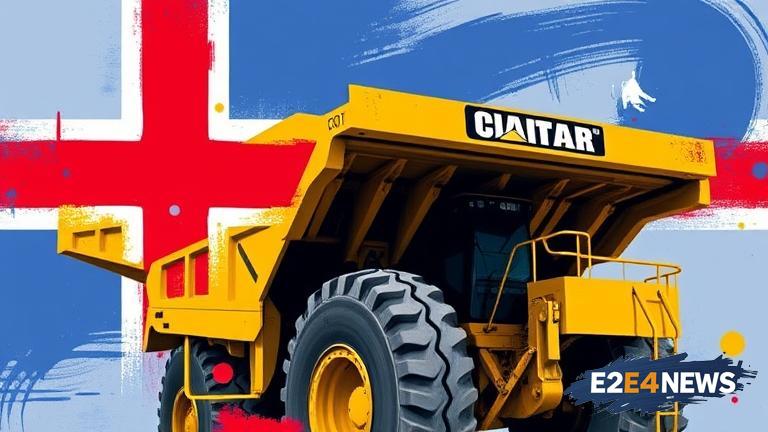In a significant move, Norway’s sovereign wealth fund has announced its decision to divest from the US-based heavy machinery manufacturer, Caterpillar. The decision comes after the fund’s ethics council raised concerns over the company’s involvement in human rights abuses in the Gaza Strip and the West Bank. The ethics council had been investigating Caterpillar’s activities in the region, where the company’s equipment has been used in the construction of Israeli settlements and the demolition of Palestinian homes. The council found that Caterpillar’s actions were in violation of international humanitarian law and human rights standards. As a result, the sovereign wealth fund has decided to exclude Caterpillar from its investment portfolio. The move is seen as a significant step towards promoting responsible and ethical investing. The decision is also expected to have a major impact on the company’s reputation and bottom line. Caterpillar has been facing criticism for its role in the Israeli-Palestinian conflict for many years. The company’s equipment has been used to demolish Palestinian homes, construct Israeli settlements, and build the separation barrier in the West Bank. Human rights groups have long been calling for companies like Caterpillar to be held accountable for their actions in the region. The Norwegian sovereign wealth fund’s decision to divest from Caterpillar is a major victory for these groups. The fund’s ethics council had been under pressure to take action against Caterpillar for several years. In 2020, the council recommended that the fund exclude Caterpillar from its portfolio, but the decision was not implemented at the time. However, after conducting a thorough review of the company’s activities, the council has now concluded that Caterpillar’s actions are indeed in violation of international humanitarian law. The decision to divest from Caterpillar is not the first time that the Norwegian sovereign wealth fund has taken action against companies involved in human rights abuses. In the past, the fund has excluded companies like Boeing and Lockheed Martin due to their involvement in the production of nuclear weapons. The fund has also excluded companies like British American Tobacco and Philip Morris International due to their involvement in the tobacco industry. The decision to divest from Caterpillar is seen as a significant step towards promoting responsible and ethical investing. The move is expected to have a major impact on the company’s reputation and bottom line. Caterpillar has not yet commented on the decision, but the company is likely to face significant backlash from human rights groups and investors. The decision is also expected to have implications for other companies involved in the Israeli-Palestinian conflict. The Norwegian sovereign wealth fund’s decision to divest from Caterpillar is a major victory for human rights groups and a significant step towards promoting responsible and ethical investing. The move is expected to have a major impact on the company’s reputation and bottom line, and is likely to have implications for other companies involved in the conflict. In recent years, there has been a growing trend towards responsible and ethical investing, with many investors increasingly considering environmental, social, and governance (ESG) factors when making investment decisions. The Norwegian sovereign wealth fund’s decision to divest from Caterpillar is a significant example of this trend. The fund’s ethics council has been at the forefront of this movement, and has played a key role in promoting responsible and ethical investing. The council’s decision to exclude Caterpillar from the fund’s portfolio is a major victory for human rights groups and a significant step towards promoting responsible and ethical investing. The move is expected to have a major impact on the company’s reputation and bottom line, and is likely to have implications for other companies involved in the conflict. The decision is also expected to have implications for the Israeli-Palestinian conflict as a whole, and is likely to increase pressure on companies involved in the conflict to respect human rights and international humanitarian law. In conclusion, the Norwegian sovereign wealth fund’s decision to divest from Caterpillar is a significant step towards promoting responsible and ethical investing. The move is expected to have a major impact on the company’s reputation and bottom line, and is likely to have implications for other companies involved in the conflict. The decision is a major victory for human rights groups and a significant step towards promoting responsible and ethical investing.
